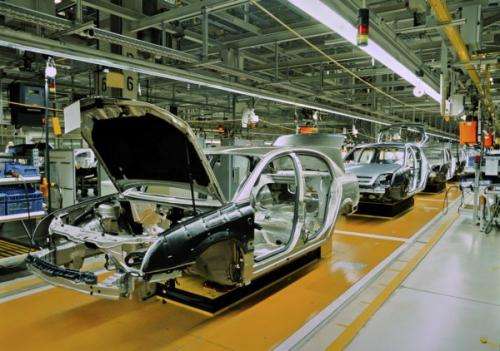Researcher uses computer models to analyse rejects in manufacturing processes

Doctoral degree candidate Jan Harmen Wiebenga of the University of Twente has come up with a solution for ensuring that fewer components manufactured in the automotive industry are rejected. The consequence of just a small percentage of reject products in the automotive sector is high costs. The method developed by Wiebenga, which is based on computer models, can result in significant savings. During testing on site at one of the industrial partners involved in the research, the method was even successful in halving the number of rejects.
Many factors are involved in the manufacture of a metal product - a car bonnet, for example. Such factors may include the thickness and the strength of the material used, the amount of oil used, and temperature. These are factors that may fluctuate. A roll of material, for example, is never the same thickness all the way through. These fluctuating factors are the cause of a reject percentage during manufacture. Wiebenga uses computer models to analyse rejects in manufacturing processes. "We simulate the manufacturing process for an automotive component using a computer. The component could be a car bonnet, for example. The simulation needs to reflect the actual process as much as possible. We then optimize the process, running the simulation many, many times. We adjust factors such as temperature, thickness, strength, tooling dimensions, speed and so on in a shrewd way until we find the optimum combination. We then provide our industrial partner with feedback."
An aspect of the solution that is new is that Wiebenga uses his computer models to predict how many rejects a manufacturer can expect. This can be done even before the factory orders tooling and invests a large amount of money in order to start up production. "Using our method, businesses are able to order optimally designed tooling for their factories, resulting in a minimum of rejects. In addition to helping manufacturers select the right tooling, we also help them to adjust aspects of their processes, such as speed or process power." While carrying out his doctoral research, Wiebenga, together with Johan Hol, founded a spin-off company under the name Innprove Solutions. The industry has shown a lot of interest in Wiebenga's method and now manufacturers in the German automotive industry, in particular, are among the company's clients.
During testing on site at one of the industrial partners involved in the research, rejects were halved. "The product involved was a Tata Steel test product," explains Wiebenga. "We looked at crack formation in a product and at accuracy of shape. We reduced rejects by 50% through using computer models. The product involved was a simple test product, but the research did show what our method is capable of in practice."
Jan Harmen Wiebenga carried out his research at the Applied Mechanics department at the University of Twente, in cooperation with the M2i research institute. His thesis supervisor is Prof. dr. ir. Ton van den Boogaard. The research was made possible with the support of Tata Steel, Philips, Bosch and Inpro. Wiebenga will obtain his doctoral degree on 21 February. His doctoral thesis is entitled 'Robust design and optimization of forming processes'.
Provided by University of Twente





















